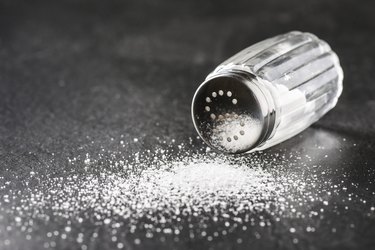
Though Epsom salt and table salt both fit the definition of a salt (a chemical that combines a positive and negative ion), they don't have much in common beyond that. Read on to learn about the key differences between Epsom salt and table salt and the ways they're each used.
Epsom Salt and Table Salt, Defined
Video of the Day
"In chemistry, salt is any chemical that combines a positive and negative ion," says Yili Huang DO, director of the Pain Management Center at Northwell Health's Phelps Hospital in Sleepy Hollow, New York. "Table salt combines a sodium ion with a chloride ion. Epsom salt, by contrast, combines magnesium with sulfate."
Video of the Day
Sodium, chloride and magnesium are all electrolytes, which are key minerals that move nutrients into your cells and waste out of them, balance the amount of water and acidity in your body, and help your nerves, muscles and heart work as they should, according to the U.S. National Library of Medicine.
Epsom salt is magnesium sulfate, and though it has medicinal properties, it can be purchased without a prescription, according to the Mayo Clinic. It typically comes in powder form and can be dissolved in a bath or in water to drink, depending on what you're using it for. Its name comes from a saline spring in England, according to the Cleveland Clinic.
Table salt is usually mined from underground salt deposits, according to the Mayo Clinic. It goes through heavy processing to eliminate minerals. This results in almost entirely sodium chloride, according to the Health Sciences Academy. It may contain an additive to prevent it from clumping together, per the Mayo Clinic, and in most cases table salt also contains iodine, which is a nutrient critical for thyroid health.
They're completely different compounds, but too much of either can cause problems.
Epsom Salt Uses
Magnesium-forward Epsom salt can be used as a laxative or for the treatment of asthma, eclamptic seizures in pregnancy and to regulate heart rhythms, Dr. Huang says. "It is very important to work with your doctor when consuming it because there can be potentially serious toxic effects to the heart, liver [and] nervous system, and [its use] can lead to weakness or even sudden cardiac arrest," Dr. Huang says.
According to the Mayo Clinic, it can also be used to temporarily relieve constipation.
Epsom salt can be ingested, but it can also be used as part of a soaking solution, though there is some disagreement in the medical arena about how effective it is. Soaking in Epsom salt may be effective for relief of minor bruises, sprains, stiffness, soreness, tired feet and muscle aches or discomfort, according to the Mayo Clinic.
Dr. Huang is more skeptical: "Epsom salt theoretically can be absorbed into the skin in a bath, but there is little medical evidence that this process actually occurs in a bath," he says. "At the same time, bathing in warm water can help decrease joint stiffness and relax muscles as well."
But Dr. Huang clarifies that while magnesium does not prevent pain itself, it does play an important role in decreasing sensitivity to pain. "Therefore, another theoretic reason that Epsom salt baths may help [people living with] chronic pain may be that it [could] help improve deficiencies in magnesium. This may be an interesting area for further research."
Before you use Epsom salt, there are some factors to consider, according to the Mayo Clinic. Talk to your health care provider about how to safely use Epsom salt, and be sure they know all of the medications you take so they can look out for any potential interactions.
Table Salt Uses
** **
Sodium chloride-forward table salt contains about the same amount of sodium as kosher salt and sea salt, so it's fine to use whichever of these salts most suits your fancy when it comes to cooking, per the American Heart Association.
But go easy: While you no doubt know salt can boost the flavor in your meals, too much sodium chloride in the diet is linked to hypertension, bone loss, kidney stones and even cancer, according to Oregon State University.
- Yili Huang DO, DABA, director, Pain Management Center, Northwell Health’s Phelps Hospital, Sleepy Hollow, New York
- U.S. National Library of Medicine: “Fluid and Electrolyte Balance”
- Mayo Clinic: “What's the Difference Between Sea Salt and Table Salt?”
- Cleveland Clinic: “7 Things You Probably Didn’t Know About Epsom Salt”
- Mayo Clinic Drugs and Supplements: “Magnesium Sulfate”
- American Heart Association: “Sea Salt vs. Table Salt: What Is the Difference Between Sea Salt and Table Salt ?”
- Health Sciences Academy: Sea Salt vs Table Salt: What’s the Difference?
- Oregon State University: “Sodium (Chloride)”
Is this an emergency? If you are experiencing serious medical symptoms, please see the National Library of Medicine’s list of signs you need emergency medical attention or call 911.